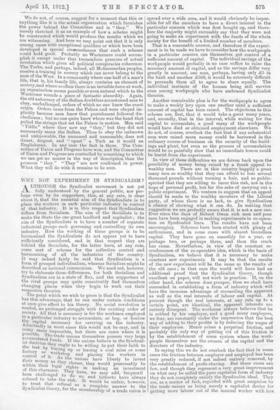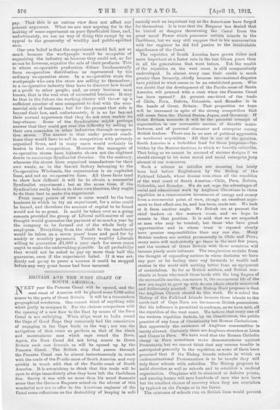WHY NOT EXPERIMENT IN SYNDICALISM ?
ALTHOUGH the Syndicalist movement is not yet fully understood by the general public, nor per- haps even by its supporters, this, at any rate, is clear about it, that the essential aim of the Syndicalists is to place the workers in each particular industry in control of that industry. It is in this respect that Syndicalism differs from Socialism. The aim of the Socialists is to make the State the one groat landlord and capitalist ; the aim of the Syndicalists is to have a number of separate industrial groups each governing and controlling its own industry. How the working of those groups is to be harmonized the Syndicalists do not appear yet to have sufficiently considered, and in that respect they are behind the Socialists, for the latter have, at any rate, some sort of scheme for the collective control and harmonizing of all the industries of the country. It may indeed fairly be said that Syndicalism is a form of grouped individualism, whereas Socialism might be described as national communism. We need not, however, try to elaborate these differences, for both Socialism and Syndicalism are in a state of flux, and the supporters of the rival groups may quite conceivably find themselves changing places when they begin to work out their respective theories.
The point which we wish to press is that the Syndicalist has this advantage, that lie can under certain conditions at once give effect to his theory. No social revolution is needed, no prolonged struggle with the existing order of society. All that is necessary is for the workmen employed in a particular industry to accumulate, or beg, or borrow the capital necessary for carrying on tho industry. Admittedly in most cases this would not be easy, and in many cases impossible, but there are cases whore it is possible. The trade unions themselves possess very large accumulated funds. If the unions believe in the Syndical- ist doctrine they ought to be willing to put their faith to the test by buying houP or leasing a coal mine or some control of it. p and placing the workers in As tho unions have liberty to invest their money as they choose they would presumably be within their legal rights in making an investment of this character. They have, , we may add, frequentl been challenged to do so, and hitherto have always refused to take the risk. It would be unfair, however, to treat that refusal as a complete answer to the Syndicalist theory, for the membership bf a trade union is spread over a wide area, and it would obviously be impos- sible for all the members to have a direct interest in the particular concern which was first bought up, and there- fore the majority might excusably say that they were not going to make an experiment with the funds of the whole society for the benefit of a limited number of members. That is a reasonable answer, and therefore if the experi- ment is to be made wo have to consider how the workpeople in a particular concern can themselves get control of a, sufficient amount of capital. The individual savings of the workpeople would probably in no case suffice to raise the necessary amount of capital, and as the savings differ very greatly in amount, one man, perhaps, having only ..e5 iii the bank and another £500, it would be extremely difficult to persuade them all to agree to share equally. The individual instincts of the human being .still survive even among workpeople who have embraced Syndicalist theories.
Another conceivable plan is for the workpeople to agree to make a weekly levy upon one another until a sufficient amount of capital has been raised. The objections to this scheme are, first, that it would take a great many years, and, secondly, that in the interval, while waiting for the capital to accumulate, a good many of the workpeople would have died or obtained employment elsewhere. We do not, of course, overlook the fact that if any substantial sum were raised more money could be borrowed in the ordinary course of business on the security of the build- ings and plant, but even so the process of accumulation would be so painfully slow that no immediate lesson could be learnt from the experiment.
In view of these difficulties we are driven back upon the possibility of money being raised by a frank appeal to wealthy men. There are in this country happily a great many mon so wealthy that they can afford to lose several thousand pounds without turning a hair, and so public- spirited that they are willing to incur this risk, not in the hope of personal profit, but for the sake of carrying out a public experiment. We venture to suggest that an appeal should be made to the wealthy members of the Liberal party, of whom there is no lack, to give Syndicalism a chance of showing what it can do. In snaking that suggestion we are perfectly aware that it is not a new one. Ever since the days of Robert Owen rich men and poor men have been engaged in making experiments in co-opera- tion on Syndicalist lines. The results have not been encouraging. Schemes have been started with plenty of enthusiasm, and in some cases with almost boundless capital. They have gone on smoothly for a year, or perhaps two, or perhaps three, and then the crash has come. Nevertheless, in view of the constant re- crudescence of the co-operative idea, which is the basis of Syndicalism, we believe that it is necessary to make constant new experiments. It may be that the results of the new experiment wilt be the same as the results of the old ones ; in that case the world will have had an additional proof that the Syndicalist theory, though excellent on paper, will not work in practice. If, on the other hand, the scheme does prosper, then we shall have succeeded in establishing a, form of industry which wilt have the immense advantage of reconciling the apparent as well as the real interests of labour and capital. At present though the real interests, at any rate up to a certain point, are identical, the apparent interests are entirely divergent. The workman always believes that he is robbed by his employer, and a good many employers, we fear, are constantly under tho impression that the best way. of adding to their profits is by reducing the wages of their employees. Hence arises a perpetual friction, and probably the only way of getting rid of this friction is by the establishment of some system where the work- people themselves are the owners of the capital and the directors of the industry. In saying this we do not overlook the fact that in some cases the friction between employer and employed has been very greatly reduced, if not indeed entirely removed, by the establishment of profit-sharing. But those cases are few, and though they represent a very great improvement on what may be called the pure capitalist form of industry they do not completely satisfy the Syndicalist ideal. They are, as a matter of fact, regarded with great suspicion by the trade unions as being merely a capitalist device for getting more labour out of the manual worker with less pay. That this is an untrue view does not affect our present argument. What we are now arguing for is the making of somo experiment on pure Syndicalist lines, and, unfortunately, we see no way of doing this except by an appeal to the generosity of wealthy and public-spirited men.
Our own belief is that the experiment would fail, not so much because the workpeople would be incapable of organizing the industry as because they could not, so far as can be foreseen, organize the sale of their products. This is where co-operative production differs fundamentally from co-operative distribution as represented by the ordinary co-operative store. In a, co-operative store the work people who own the store are selling to themselves ; in a co-operative industry they have to discover how to sell at a profit to other people; and, as every business man knows, that is the real crux of successful business. It may be that in the future the working classes will throw up a sufficient number of men competent to deal with the com- mercial side of business ; but for the present that side is beyond their ken, and, unfortunately, it is so far beyond their normal experience that they do not even realize its importance. Some of the Syndicalists might perhaps answer that they could get over the difficulty by selling to their own comrades in other industries through co-opera- tive stores. The answer is that under present condi- tions they would have to sell in competition with privately organized firms, and in many cases would certainly be beaten in that competition. Moreover the managers of co-operative stores have hitherto shown not the slightest desire to encourage Syndicalist theories. On the coutntry, wherever the stores him organized manufacture for their own wants, as in the biscuit factory belonging to the Co-operative Wholesale, the organization is on capitalist lines, and not on co-operative lines. All these facts tend to show how difficult it will be to obtain a successful Syndicalist experiment ; but at the same time, if the Syndicalists really believe in their own theories, they ought to do their best to make the experiment.
From many points of view a mine would be the best business in which to try an experiment, for a mine could be leased, and therefore the amount of capital to be found would not be so great. It could be taken over as a going concern provided the group of Liberal millionaires of our thought would guarantee the payment of so much a year by the company to be formed out of the whole body of employees. Everything from the shaft to the machinery would be taken on a, seven years' lease and paid for by weekly or monthly payments. Twenty wealthy Liberals willing to guarantee £1,000 a year each for seven years ought to make the undertaking possible. In all probability they would not be asked to pay up more than half the guarantee, even if the experiment failed. If it was evi- dently not gong to prove a success it could be stopped before any very great losses had been incurred.







































 Previous page
Previous page